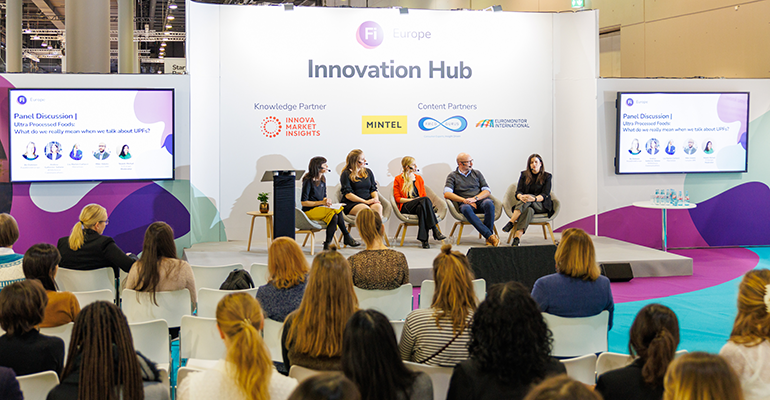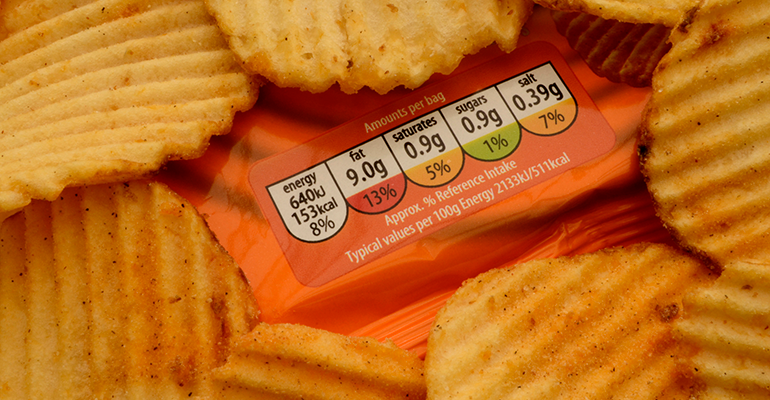News
Is it useful to classify foods as ultra-processed?
26 Jan 2024The term ‘ultra-processed’ is gaining traction – and notoriety. But does it help consumers make healthier food choices or encourage manufacturers to make their ultra-processed products healthier? Food industry stakeholders explored the term’s usefulness at Fi Europe.
Exploring what UPF classification means for the food industry, industry insiders came together at Fi Europe 2023 to discuss the merits and problems of applying a classification system for UPFs.

The classification was created in 2010 when Brazilian researchers developed the NOVA system, classifying food and beverages according to their degree of processing. The UPF classification comprises snacks, drinks, ready meals, and other product types largely or entirely formulated by substances extracted from or derived from food constituents.
The term gained headlines in 2023, with various organisations promoting new and updated stances on UPFs and increasing concerns over ultra-processed food and beverage guidance. As a result, it has prompted many to question whether a UPF classification system is a necessity to help consumers make healthier food choices.
“I don’t think it’s a useful term,” said Mike Adams, head of product innovation at Campden BRI, a global food and drink research and consultancy organisation. “I actually think it generates confusion.” Instead, suggesting it would be useful to pinpoint and identify what is behind ultra-processed when one of the challenges the industry faces is how it communicates UPFs to the public.
While industry insiders are familiar with the NOVA system, there is the concern that other stakeholders such as policymakers and regulators may not be familiar with it when they consider UPFs. “They mix different issues like the nutrient profile of foods, foods that are high in fat, salt, and sugar (HFSS), and then concerns with additives in general,” said Andrea Gutierrez-Solana Delgado, associate director at White House Communications, a public affairs and political communications agency.
Subsequently, stakeholders incorporate “a number of fears around different issues impacting nutrition”, Gutierrez-Solana Delgado added.
Adams said: “At the moment, academia, industry, and government are talking, but the message going to consumers is often wrong.”
Moving away from processing as the problem
Bo Dohmen, manager for nutrition and health at industry representatives, Food Drink Europe, said during the panel: “Classifying foods based on the level of processing is not linked to the nutrient quality of food.”
 © iStock/HotHibiscus
© iStock/HotHibiscus
Categorising foods based on their level of processing creates a “false assumption”, Dohmen continued, that there is a relationship between the degree of processing and the healthiness of a product. “Rather than focusing on the processing itself, we believe it’s better to look at the nutritional content and how the food and drink fits into your daily diet.”
A growing body of research urges against the reliance on equating processed foods with a lack of nutrition. “Food processing in itself is not the issue,” The World Health Organization’s (WHO) Food and Agriculture Organization (FAO) said in its 2019 paper, Ultra-processed foods, diet quality, and health using the NOVA classification system. Highlighting that practically all food is processed somehow, WHO calls for the necessity of science and evidential reasoning to back sentiments on processing.
Diets rather than individual foods may be to blame, the panel suggested. “There are very few unhealthy foods, but there are lots of unhealthy diets,” said Adams. In exploring the usefulness of UPF understanding, Adams relayed the idea that UPFs have come under fire as a target because they are perceived as the easiest way to improve the population’s health. “Everyone is looking for an easy win,” said Adams.
Calling for education
Lia Carlucci, co-founder of Nutrition Hub, a German think tank, said:“It’s all about education as it always is.” Educating consumers and creating an understanding of what the term UPFs means is crucial. Approaching classification from the consumer perspective is needed, Carlucci said: “We need to put our consumer hats on a bit more.”
Recognising public conversations and the evolving regulatory landscape, Carlucci anticipates UPFs labels in some form and highlighted that the industry is seeing this today in certain categories.
“Do I think they’re useful? Personally, no,” Calucci said, emphasising that UPF classification labels would place a requirement on consumers “that they have a PhD in food science to understand the landscape of labels”.
Is it GMO? Is it organic? Is it vegan? Is it ultra-processed? Putting all these labels into a framework and understanding, Carlucci states: “We have to be aware of the limitations”. Due to how UPFs are classified, many foods will be omitted from this system.
Ultimately, while they can guide consumers, “it is always just a label”, she said, prompting the need for education.
Related news

Colombia introduces tax on ultra-processed foods
7 Dec 2023
In a bid to curb rates of obesity and other non-communicable disease, the Colombian government has introduced a tax on various ultra-processed food (UPF) and drink products.
Read more